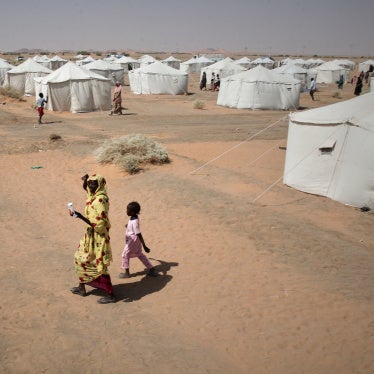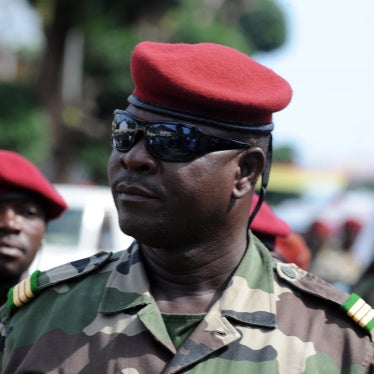(Brussels) - Judges in the newly restored court in the Ituri district of the Democratic Republic of the Congo (DRC) must intensify efforts to prosecute serious human rights crimes, Human Rights Watch said in a briefing paper released today. Since 1999, armed conflict among rebel factions, local ethnic groups, and foreign fighters in the northeastern region has resulted in numerous atrocities that have gone unpunished.
On August 17, the court in Bunia, Ituri's capital, handed down its most serious conviction so far. Human Rights Watch welcomed the court's prosecution of Commander Rafiki Saba Aimaible, the former security chief of the Union of Congolese Patriots (UPC), an armed group in Ituri responsible for serious crimes. Commander Rafiki was found guilty of arbitrary arrests aggravated by torture, and sentenced to 20 years in prison.
With support from the European Commission, the Ituri court resumed its work six months ago after having been closed since May 2003, when its judges had to flee deteriorating security conditions. However, the new investigative judges assigned to the court have largely limited prosecutions to minor crimes and have not investigated the more serious human rights abuses. In one case, the leader of one armed group was charged on the basis of theft, but the prosecutor failed to bring charges of murder, rape, or torture committed by people under the suspect's direct command, which had been documented by Human Rights Watch. The court has lacked the political will to take on these more serious cases.
National courts, such as the tribunal in Bunia, will need to complement the work of the International Criminal Court (ICC), which started investigating war crimes in the DRC on June 23 - the first-ever investigation by the new international court. The ICC will focus on the most senior perpetrators, and is unlikely to be able to try lesser-ranking individuals who also carried out abuses. These perpetrators will need to be tried by national courts.
"If the new court in Bunia is to be effective, it must prosecute the gravest crimes as well as minor offenses," said Pascal Kambale, counsel for Human Rights Watch's International Justice Program. "The ICC will focus on the high-level perpetrators, so the national courts must ensure that other suspected human rights criminals don't get off the hook."
In November, the European Commission and other donors initiated a six-month project to help restore the criminal justice system in Bunia. This short-term funding helped judges and investigative judges start working again years after the court had been closed, but many serious problems remain. There is no capable police force able to carry out investigations, and there is a lack of protection for witnesses who come forward to testify.
The Human Rights Watch briefing paper, "Making Justice Work: Restoration of the Legal System in Ituri, DRC," highlights the strengths and weaknesses of the justice program in Ituri, seen by many as the potential test case for rebuilding the largely defunct justice system throughout the DRC. It calls international donors and the DRC transitional government to provide longer-term funding and support to the criminal justice system.
"The Ituri justice program is a foundation for rebuilding the national justice system," said Kambale. "If the government and international donors are serious about ending the cycle of violence and securing justice for victims, they must ensure there is more funding and political will to make this happen."
Human Rights Watch has documented serious crimes in the conflict that ravaged Ituri since 1999, including ethnic massacres, rape, and torture. A local conflict between Hema and Lendu ethnic groups allied with national rebel groups and foreign backers, including Uganda and Rwanda, has claimed over 60,000 lives since 1999, according to United Nations estimates. In the past eight months, fighting has decreased in the area, though human rights abuses continue.
"The conviction of Commander Rafiki is a good start for the court in Ituri," said Kambale. "We need to see more trials focusing on these serious human rights crimes to help end the cycle of violence and ensure that victims see justice being done."








